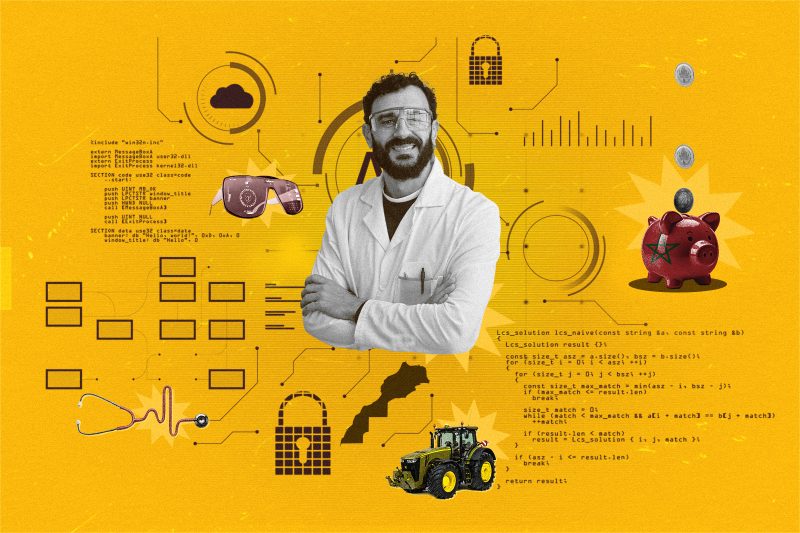When Taib Hezzaz and his team of engineers and technicians developed glasses that could help the blind and deaf see and hear the world around them, they thought they product was a definite sell.
“We tried to get funding for the project, but no luck,” Hazzaz said. “several countries are interested in such tools, but since it’s 100% Moroccan product we wanted to keep it local.”
And this is just one example of the many projects that have been left in the dust due to a lack of interest and funding, says Taib Hezzaz, head of WEHELP and an AI and cybersecurity expert.
Hezzaz says that the biggest problem for AI in Morocco is money.
“Researchers and private companies need more funding. Moroccans are really into AI and you see it in all those international competitions where they’re winning,” the expert says.
The CESE’s recent AI report doubled down on the issue of funding in AI projects especially the hurdles posed by Morocco’s latest investment charter which doesn’t seem to be doing enough to support AI startups.
Read also: Investment Charter: unearthed 10 year old ambition, explained
According to the report, the charter’s rules for getting financial aid are ill-fitted for AI startups. To qualify for higher incentives, a company needs to create over 50 jobs or invest more than MAD 50 million.
That’s a tall order for many AI startups, which are often small teams focused on research and development, not rapid job growth.
WEHELP, the cybersecurity and AI firm, is a case in point. Despite being in business for over five years, the company employs a team of 13 engineers and 20 technicians, barely meeting the charter’s criteria.
“While the funding situation might seem bleak, Morocco’s AI scene is actually quite promising,” says Meriem Bessa, CEO & Co Founder of phoenix AI.
Morocco is a serious contender on the African AI scene, ranking among the top 10 in both Africa and the Arab world.
Morocco’s strong infrastructure has earned it the top spot in Africa on the Global AI Index. And when it comes to government readiness for AI, Morocco is fifth in Africa, right behind established AI leaders like Mauritius and Egypt.
The country’s academic prowess has also been on the rise. With over 4500 AI publications since 1996, Morocco is a top-three African nation for AI research, trailing only Egypt and South Africa.
Universities in particular have been scrambling to offer AI courses, with students eager to learn.
Chahybi pointed out that while Morocco’s AI scene is promising, scientific research in AI is a bit underfunded, which means researchers often struggle to get their hands on the tools they need, like lab equipment and computers.
“We’ve got cloud computers in UMSP in Benguerir, but it’s like they’re locked away,” Chahybi said. “We don’t know why we can’t access them.”
To make matters worse, there aren’t many opportunities for Moroccan researchers to team up with experts from other countries, says the PhD researcher. Researchers in public universities mostly have to rely on their own skills and resources.
“While some universities like Al Akhawayn and UM6P are doing great work, it’s mostly private entities that have the deep pockets to really push AI research forward,” Chhaybi said.
The researcher explained that AI research in Morocco is currently focused on cybersecurity and connectivity, and that AI technology isn’t being fully used in crucial sectors like education and healthcare.
“There are plenty of great ideas on paper, especially in healthcare,” the researcher said, “but we’re not seeing them put into practice.”
The problem, it seems, isn’t a lack of research, but a gap between research and implementation.
“While private companies, especially cybersecurity firms, are already leveraging AI, the public sector often relies on off-the-shelf solutions instead of investing in its own AI research to address specific challenges,”Chhaybi said.
The existing AI research is primarily focused on boosting agriculture. One example is a program developed by Wehelp, which allows farmers to simply snap a photo of a sick plant and receive a diagnosis and treatment plan.
Another impressive AI application is a program that can count livestock and identify health issues like limping sheep.
This move to use AI in farming is right in line with the CESE’s suggestion to focus on a few key areas where AI can make the biggest difference; agriculture being one them.
However, Hezzaz believes that Morocco should expand its AI focus beyond agriculture. This sentiment is echoed by McKinsey & Company, who identified eight sectors ripe for AI adoption in their 2018 study, “Digital and Artificial Intelligence Potential.”
These sectors include banking, telecommunications, insurance, automotive, agriculture, energy, entrepreneurship, and e-government.
Hezzaz says that “while focusing on agriculture is a great start, we shouldn’t limit ourselves. Morocco has the potential to benefit from AI in many other areas. As we embrace technology, it’s crucial to prioritize data security and protection.”
The government hopped on the AI bandwagon. Ministries like the Interior, Foreign Affairs, and even the military are now using AI to boost their operations.
These public agencies are turning to both local and international companies to provide these AI tools. While Moroccan companies offer budget-friendly solutions, foreign companies often charge a premium, Hezzaz explained.
“But there’s a new trend emerging: government agencies are starting to build their own in-house AI teams to create custom solutions that perfectly fit their needs,” Hezzaz says.
The banking sector is also getting a taste of the AI revolution. An example: one can simply deposit cash into an ATM, and AI will automatically verify the bills, detecting any counterfeits, and credit one’s account instantly.
Many other banks have rolled out chatbots and virtual assistants to help customers quickly and easily.
These AI helpers can answer questions, troubleshoot problems, and even process simple requests, reducing wait times and improving the overall customer experience.
AI is also keeping a watchful eye on financial transactions, helping to detect and prevent fraud.
To support the expansion of AI research and developments, Morocco launched programs like “Al Khawarizmi” in 2019 which funded 45 AI research projects with a budget of approximately MAD 50 million. The AI Movement Center at UM6P has also pushing the boundaries of AI technology.
This year, the Mohammed VI Fund for Investment, along with the Digital Transition Ministry and Caisse de Dépôt et de Gestion, put out a call for funding applications for innovative companies, including those working on AI.
But all these efforts operate in isolation, disconnected from the real-world needs of Moroccan businesses, according to the CESE’s report.
Morocco’s AI scene is fragmented due to the absence of a unified national strategy. Morocco AI recommendations divide strategies into two: funded strategies, which involve concrete actions and budgets, and guiding strategies, which set long-term goals.
While neighboring countries like South Africa, Kenya, and Nigeria have already established national AI strategies, Morocco is still playing catch-up.
South Africa, for instance, established the AI Institute of South Africa (AIISA) which aims to advance AI research, development, and adoption in both the public and private sectors.
To catch up with these countries, the CESE report recommended the creation of a National AI Strategy and for AI classes become a regular part of every university degree, so more students can learn about it.
The post AI in Morocco: Big Ideas, big Potential, but no cash to make them happen appeared first on HESPRESS English – Morocco News.





 No products in the cart.
No products in the cart.